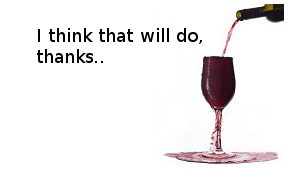 Today’s post is going to be about a particular use of the verb ‘do’. The verb ‘do’ can be used as an auxiliary verb:
Today’s post is going to be about a particular use of the verb ‘do’. The verb ‘do’ can be used as an auxiliary verb:
Do you often go the cinema? No, I don’t
or as a main verb meaning ‘to perform an action, activity etc”:
I do sports everyday (>>transitive use of do where ‘sports’ is the object)
but have you ever heard the sentence ‘that will do, thanks‘? Indeed this is a very common use of ‘do’ as an intransitive verb (an intransitive verb is a verb not followed by any object). But what does this expression mean and when to use it?
‘that will do’ to mean ‘that’s enough’
Basically, every time you want to say ‘that’s enough‘ you can just say ‘that will do’. Imagine you were at a friend’s house and they were pouring some wine into your glass, as soon as you think they’ve poured enough you can just say ‘that will do, thanks!’. Not being a big drinker, this sentence comes in handy when I’m around Brits (who drink like crazy by the way:)
The same way you’d ask a guest that you’re serving some cake ‘will that do for you or would you like some more?’ meaning ‘will that piece of cake be enough or would you like some more?’
‘that will do’ to mean ‘that will work’
Look at this example:
A: I couldn’t find some glue but I’ve got some tape.
B: That will do, thanks!
In this case, the expression ‘that will do’ stands for ‘the tape will work just fine‘ or ‘the tape will do the job‘.
And here’s a negative sentence:
Sometimes I try to make jokes to make him laugh, but that will not do. >> My jokes don’t work, they don’t make him laugh.
‘subject+ could do with + something’ to mean ‘subject+ would be better’
In all the examples below, ‘could do’ is used to mean ‘would be better’:
I could do with a bit more money >> I would be better if I had more money
This pasta could do with more salt >> This pasta would taste better if you added some salt
Moving out of my last flat was so tiring, I could have done with a bit of help >> It would have been better if someone had helped me
So now go out there and try using these expressions! 🙂
Talk soon,
Deb